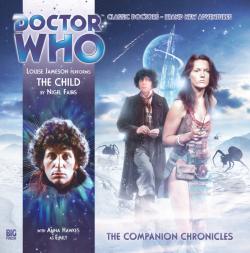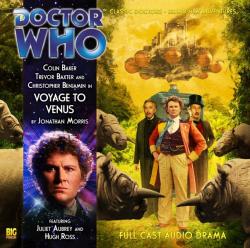1001 Nights (Big Finish)
Saturday, 19 January 2013 - Reviewed by

1001 Nights
Big Finish Productions
Written by Emma Beeby and Gordon Rennie, Jonathan Barnes, Catherine Harvey
Released December 2012
Penned by 4 different authors, this years Big Finish Christmas offering is a wonderful adaptation of the ancient tale 1001 Nights, maybe better know on these shores as the Arabian Nights.
The classic version of the tale is a collection of short stories from far and wide, hence the multiple contributors – though these are actually estimated as being somewhere in the region of 260 and the phrase 1001 nights considered just an exaggerated term for many. Legend says that any person who reads the whole collection would go insane and the theme of insanity is one that is touched on throughout this intriguing reimagining.
Though there are countless versions of the tale, all share a common theme, that of a Persian King and his new bride. Having had his wife executed for her infidelity, he becomes bitter and marries a succession of virgins who he executes the next morning, until he meets the daughter of Vizier – the man charged with identifying them on his behalf. In order to ensure her survival, the daughter tells the King a story, but she purposefully does not finish by nightfall. A curious King orders her to proceed with her tale the following evening - and so she continues for 1001 nights.
Here, the storyteller is Nyssa, who is forced to recount tales of her adventures with her time travelling companion, so as to keep the imprisoned Doctor alive. But who is the mysterious Sultan and the captive who resides in the dungeon with our timelord hero?
The Plot:
With the Doctor locked away in a prison cell awaiting execution, Nyssa plots to delay his demise by telling stories of their travels to the Sultan. Speaking of their adventures and how they moved between worlds, she explains that they came to the planet to deactivate a beacon that was hidden in the Palace, belonging to the Gantha - the Sultan’s interest is peaked.Her next tale sees the travellers aiming for the Celestial Basilica, but in true Tardis style, they arrive instead in prison grounds, to find a man tortured in an electric chair surrounded by a fixed atom force field. Here we are introduced to the Myaxa and a truth that binds prisoner and executioner together throughout eternity.
Next we meet Elizabeth Spinker, resident of a large house with a single aid –her other servants having long since fled. Screams are heard loudly in the distance as she awaits the arrival of the specialist, a man her father knew long ago. A ring at the doorbell indicates his arrival and reveals the identity of a man who left the patient there long, long ago – so as not to infect his Tardis. Here he tackles a mysterious virus and tries to release the friend within whom it resides.
As Nyssa moves on to her next tale, deep in the dungeons, the Doctor finally uncovers the true identity of the man aiding his escape and they make their way towards the Tardis – but they are not alone in their quest. As Nyssa feeds her captor more and more information, so the Doctor begins to weaken and his memories begin to fade. Will they arrive before his mind is lost forever?
What Works:
Well firstly, he’s my Doctor… we’ve all got one and I’m not ashamed to admit it. Peter Davison is on top form in this offering and Sarah Sutton delivers an equally accomplished performance.The individual stories are of differing strength, but the tale that underpins them is very strong indeed and a great way to bring the curtain down on an exceptional year for big Finish.
I do love an affectionate nod to the past and this time it is delivered by Elizabeth Spiniker. Those who recall Sharaz Jek’s verbal jousting in The Caves of Androzani will remember that, whatever people make of the Doctors appearance, the eyes tell a different story.
What Doesn't:
Well not an awful lot in fact – my only gripe is the 'story of stories', where tales and jokes are currency. The concept here is very weak in comparison to the rest of the tale and brought my final rating down to reflect my disappointment. Summary:
A really strong offering with a clever and intricate plot. As for the ‘story of stories’ section, it’s what the fast forward button was made for!Rating 7.5/10











